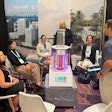
It’s a nightmare scenario. Your programs are printed, your social media promos are out, your attendees have their travel booked—and your keynote speaker cancels on you. Between medical issues, travel delays, and more, this can be an all-too-common situation that event professionals find themselves in these days—but it doesn't need to spell disaster.
We asked industry experts and frequent speakers to share their top tips for how to replace a keynote speaker at the last minute, and this is what they had to say...
1. Take steps to prevent cancelations in the first place.
Although many last-minute cancelations are out of your control, especially during the pandemic, there’s a lot you can do in advance. David Bitton—the co-founder and CMO at property management software company DoorLoop and a frequent keynote speaker at real estate industry events—advises implementing what he calls a “robust arrival protocol. Coordination of every detail should be done in advance and with as much detail as needed,” he says.
Consider assigning a staffer to serve as the key point of contact for speakers, Bitton advises. “This person will be in touch with the keynote speaker months or days before the event to confirm travel arrangements, send emails asking for a list of the equipment they need, clarify call times, and ensure the speaker has everything they need.”
Another tip? When applicable, fly your speaker in a day early, advises Melinda Marcus, the founder of consulting company Influence Advisors and a member of the National Speakers Association. “That gives you peace of mind that the speaker is there, and even if there are flight delays, there may still be time for the speaker to arrive in time for the event,” she says, adding that "if possible, you want to have a tech check the day or night before the event with the speaker there to be able to fix any technical issues in advance.”
2. Consider working with a speakers’ bureau when possible.
A speakers’ bureau can serve as something of a safety net for last-minute cancelations due to its large database of presenters, along with sales agents who are prepared for scenarios like this.
Once you’re aligned with a bureau, “if the speaker gets sick, has an emergency, or gets stuck on a delayed flight, you have a whole list of options to swap them out for,” points out Kevin Mikolajczak, the owner and lead designer of Bellevue Lighting in Seattle, who suggests focusing on the speaker's content and delivery style rather than on one single person. “Surprisingly, even if you have that perfect speaker lined up for an event, there's at least three others that would satisfy an audience," he says.
Marcus proposes building language for last-minute cancelations into contracts with the speakers’ bureau. “Ask them if they could provide you with another speaker at the last minute if the need arises,” she says. And “if you book a speaker who is a member of the National Speakers Association, you should reach out to the local NSA chapter in the city of your event in advance to get a contact who could help you find another speaker already in town, should the need arise.”
3. Make a backup plan for your marketing materials.
Like with all-things events, backup plans upon backup plans are key. “Build a list of ‘what ifs’ prior to the event so your team is ready to deploy tactics. Then, all you have to do is choose which scenario to run with versus putting out a fire,” advises Kim Lawton, founder and CEO of the New York-based experiential agency Enthuse Marketing Group.
For pre-event materials, she adds, this means having a disclaimer in fine print and event ticketing that says something like, "keynote is subject to change”—especially if there’s an autograph or signing experience planned. If the worst-case scenario does happen, be sure to quickly remove any marketing or advertising materials that promote the speaker.
And “be transparent with ticket holders through e-blasts and or texts so they are aware of a change in speaker, and focus on the content the new speaker will be delivering so it’s clear that the value remains the same,” she says.
In fact, as Lawton advises, pre-event communications should always focus on an event’s value rather than on one specific person. “Many times, a speaker/keynote is used to drive traffic and build the event. However, it’s best practice to socialize and market the event for the value it's providing, so the speaker’s name is not the only attraction,” she says. “Focus on the content first, and the name of the speaker second.”
4. Be honest with your audience—without making anyone look bad.
If a speaker does need to cancel, be sure to let your audience know—but then move on and focus on the positives of why people should still be excited about the event. Depending on the situation, say our experts, it may not be advisable to share more information about the reason behind the cancelation, both to protect the speakers’ privacy and to avoid unnecessary distractions for attendees.
“If they cancel for reasons that are moral or financial or otherwise sensitive in nature, there's no reason to expose dirty laundry,” points out Erin Mills, CEO and founder of experiential marketing agency Strat House in New York. “You can honor their decision and note, as needed, that it simply didn't work out. There are even opportunities to share what was learned from this scenario and impart a teachable moment, if appropriate, to attendees.”
5. Lean into the positives, and get creative with your programming.
While no one wants a last-minute shakeup, try to reframe the situation in your mind to focus on the positives—whether that’s a different keynote speaker or a format change that can bring new energy to the event. “Can the new speaker offer something of value to the guests so there is something ‘unexpected’ delivered, and there’s a feeling of winning versus losing?” Lawton asks. “You could also offer a discount on the next event.”
Mills shares an anecdote where she was managing a high-profile sporting event and the scheduled performing artist dropped out at the last minute, forcing the event team to replace them with someone who wasn’t as well-known. “Instead of it being a negative, it allowed us to create opportunities that just wouldn't have been possible with the more famous artist who was originally set to perform,” she remembers. “We were able to do meet-and-greets with the attendees, and the replacement artist was able to provide their fans directly with their branded merch. ... The exclusive access to the new artist provided to the attendees more than made up for the change.”
Bobbie Carlton, founder of the mission-oriented speakers' bureau Innovation Women, which aims to get more women onstage at conferences and events, has run into several scenarios with last-minute speaker changes—including one where she was personally asked to get on stage after a cancelation.
“I had previously spoken for the organization, and they were very familiar with me and my presentations. Since I was already scheduled to speak, I was there and ready to go,” she says, noting that her previously scheduled session was turned into a fireside chat that took place during the morning keynote spot.
“Know your speakers and who would be capable of stepping in, and consider different formats/options of speaking,” Carlton advises. “I never build an event around a single keynote speaker. If one speaker doesn’t show up, we have others already scheduled.”
6. See if the original speaker can plan to record an intro or short video.
Assuming remote attendance isn’t an option for your speakers, see if they’d be willing to record a short introduction video or message to attendees.
It's a tactic Mills used when an event host had to cancel at the last minute due to medical reasons. “We were able to record an opening segment that included him and that allowed him to still preside and welcome and be transparent about his reasons for not being able to attend in person," she remembers. "We [also] wove different opportunities to invoke the host throughout the event, with the new host and other honorees making a nod to the absent host and wishing him well.”
Or consider having your speakers pre-record their entire speech as a backup plan; it can then be shown during the event in case they need to cancel. Or, “if recording a video is not possible, ask the speaker if they can supply post-conference content so that your audience members still feel the speaker provided them with helpful information,” suggests Bitton.



















